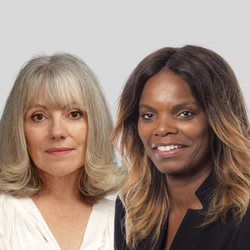‘I’m going to be me and if people don’t like it in a way, they’re going to have to adapt, because this is who I am’ – Sandra Skeete, CEO of Octavia
Below is an interview carried out towards the end of 2021 by Tracey McEachran, Campbell Tickell Associate Consultant and Chair of the London Board of Women In Social Housing (WISH).
Sandra took up the role as the Chief Executive of Octavia in September 2019. It seems appropriate as the Chair of WISH London, interviewing Sandra who is leading an organisation founded by a woman 150 years ago.
As a leadership development specialist, I spend as much of my time helping leaders to reconnect to who they are, as I do helping them develop new skills. So I was keen to use my time with Sandra to understand how she had negotiated leadership in all her intersectionality and how close she had stayed to her own essence.
As we go through life we encounter different environments and situations. Events and people can change us to the point that we lose contact with our essence, our true self – what we call our authentic self. So it was a joy to sit with Sandra and explore her own sense of her authenticity.
| TM: How would you describe yourself as a child? |
SS: I was very active. I was very curious. I didn’t necessarily do the things that I was expected to do as a young girl. I liked to try everything. I wasn’t necessarily into dolls, I was more into sport and playing games. I loved board games, I still do, I was quite physically active and liked to play lots of sports. Didn’t really enjoy doing the ‘girly’ things.
I was one of three, the middle child. I always made sure my voice was heard from a young age and was always aware of needing to do that because I wasn’t the first and I wasn’t the baby.
I was the one in the middle; I think it does kind of shape who you are as a person. I was quite studious as well. I loved books, I loved reading, I don’t read as much as I used to, not books anyway. I had small circle of friends, but really close friends who I’m still in contact with today. Quite a few of them from primary school and secondary school, so I’ve kept those connections. I’m really family oriented. A lot of the things I did as a child was with family, my immediate family and other relatives as well. I remember spending school holidays with cousins and really enjoying that. I think that probably sums me up as a child.
| TM: If you had to choose an animal that describes your heart as a child, what would the animal be? |
SS: Probably a cat, one that’s very calm, quite peaceful, thoughtful and loyal.
| TM: So what of that child still exists in you as a leader today? |
SS: I am still very curious, that has stayed with me and that’s helped me a lot: I’m still quite adventurous as well. I think that love of physical activity, although I do less physical activity now, has instilled something in me where I constantly just keep moving. I have to keep doing things at pace and I think that links back to my childhood.
My love for sport as well: I really loved netball and I captained the netball team – I played centre. Being a captain and playing centre, being everywhere is probably something that’s also stayed with me, that kind of leadership role, being able to see everything. That is what you get from playing that position in netball. Not quite in charge of getting that ball in the net, but playing quite an active role in making sure the ball gets to the right place and the right person so that someone can score the goal. That has stayed with me.
I wish I could read as much as I did. It is the time challenge for me, I still love reading, but I don’t read as much. As a child, I’d probably be reading two or three books at the same time and I’ve lost that. But still I think the creativity that reading inspires has stayed with me.
I like writing as well, and again, that’s been with me for a long time.
| TM: What else do you think you’ve lost from the child you? |
SS: I am not sure I have lost anything. I probably do things in different ways, but I was always fairly vocal. I had this thing about making sure my voice was heard as a middle child and I still do that but from a different motivation. What have I lost?
I find that quite a hard question because I don’t think I have lost a lot from the essence of who I am. I think it’s partly because as I’ve said, I’ve stayed connected with a lot people who I’ve known for a very long time. I still live in the same area that I grew up in. I’ve got a lot of the similar social networks, although those networks have clearly grown socially and professionally. I’m still very connected to my family. I really struggle to think about what I’ve lost.
| TM: That is so lovely to hear, because you have remained true to the essence of you no matter what the environment. So given that is the case, what do you think in your character or environment has enabled you to stay close to your essence? |
SS: For me, I feel that growing up in a fairly close-knit family with really strong identity has helped.
I lived in East London for most of my life. However, my parents came to the UK from Barbados, and given a number of the challenges that they faced, building that close unit was really important to their survival. They were very proud of who they were, very clear about what they wanted, and what they wanted for their family and their children. They instilled in us a confidence and sense of pride.
I feel fortunate to have both of my parents still alive. I do think that the fact that they were able to encourage us to do the best, to achieve our best and stay focused was important. There was a real focus on education and also just generally being good people.
There is a strong sense of connection from having a real sense of who we were, where we were from and where we were now. I think that has shaped me. I think that has helped me to stay grounded.
| TM: Can you think of any time in your career when you’ve been in any way disconnected from your essence? Or have you always remained really confident in who you are? |
SS: I think that the very first role that I had as a senior director, I was running a small organisation and it was my first executive role where I had overall responsibility. That was the first time where I felt under pressure to be someone else.
It didn’t take long for me to realize that this was not going to be the way I was going do it. I felt that I was constantly reminding myself about the reason why I was in this position: because I bring something unique to the table. So what is the point in losing that uniqueness? Because that’s my value I bring to the organisation and I might not be the same as everyone else in the room but that has to be my strength – that has to be my USP.
I can remember initially thinking, oh my gosh, I’m going to have to be more like them or more like that, and I thought no, that’s going to be hard work, I can’t do that. That hasn’t got me to where I am, so it’s not going to get me through this, so I just thought, no, I’m not doing that. I’m going to be me and if people don’t like it in a way, they’re going have to adapt because this is who I am.
I remember having those thoughts when I took on that particular role, but since then I haven’t. Now, I’m very clear about knowing what it is I am bringing to the table and where my strengths are, and what I need to develop: that keeps me true to who I am.
There have been occasions in work situations that have led to me questioning my values. That’s when I will ask myself, is this right for me? Sometimes you can negotiate that and move forward, but there are other times where you think actually this is not the right place for me and I am prepared to take that decision and move on.
| TM: So when you said ‘no’ to changing who you were, the fallout of that was not negative, but in fact positive? |
SS: It was positive because I could confidently say: if I’m going to succeed in this role, these are the conditions, and this is what will need to happen.
Some of that was in conversation with myself, but sometimes it was conversations with my peers and others to say this is how it’s going to have to be.
It gave me a renewed confidence because you re-center and you’re clear about what you can build on. That really helped me, and it’s something that I’ve always taken with me, that for me personally – I have to stay true to myself in any of the roles that I do.
I’m very clear about what drives me: that real commitment to public service and to respecting people that you work with. And if you expect respect, you have to respect other people. So fundamentally, it’s that, that keeps me focused.
| TM: What I hear is a clear set of values, a clear understanding of who you are, and that’s what you’ve talked about, your identity, which is so powerful. So, do you have a sense of what your purpose in this world is, what your uniqueness is and what you are here to do? |
SS: That is a big question. But, in my own small little way, I do think that I can have a positive impact, in terms of work.
My view is that every organization that I leave, I have to leave it in a much better place than it was in when I joined, building a legacy. It’s not solely about me, but it’s about making sure that whoever you are there to serve, they actually have a good experience.
I also want to help others, whether that’s in terms of their careers or guidance and support you can give. It’s about keeping people’s aspirations and hopes alive, in terms of having a dream and following it. Supporting them when they have perhaps to follow a different path to achieve their dream, overcoming different obstacles to get there. I encourage them to keep focused on what it is they want to do.
But the other thing for me is really just making sure that those around me live happy lives, because it’s all very well having material wealth and everything, but if essentially you’re not happy, then what’s it all about?
I believe that happiness shouldn’t be at the expense of others. So that’s where I feel my purpose is. It sounds a little bit cliché, doesn’t it?
| TM: It doesn’t sound cliché at all, because it’s from the heart. Everything you have said here: your understanding of your uniqueness; being in the centre; making sure the game’s being played and that everyone’s in the right position – you express your essence and your values so clearly. To finish our conversation, do you have any quotes or mottos that you think you’d like to share with anyone that is reading this? |
SS: The one for me, given the points I’ve been making about curiosity, ambition, and focus, is probably the Mae C. Jemison quote:
“Never be limited by other people’s limited imaginations”
So – dream big and do not be constrained by others.
The questions I asked Sandra are a simple way of exploring your own essence. The question about early childhood can be a way of reconnecting you with the things you found joyful before you had any limits. You can use these questions to have some fun with a close friend by interviewing each other and discovering if you are close to your authentic self.
To discuss any issues raised in this article, contact Tracey McEachran, Associate Consultant on: tracey.mceachran@campbelltickell.com. Find out more about WISH.
|
Disclaimer: We welcome guest blogs and articles for our website and CT Brief. The views, opinions and positions expressed in such blogs and articles represent those of the authors and do not represent those of Campbell Tickell.
|



